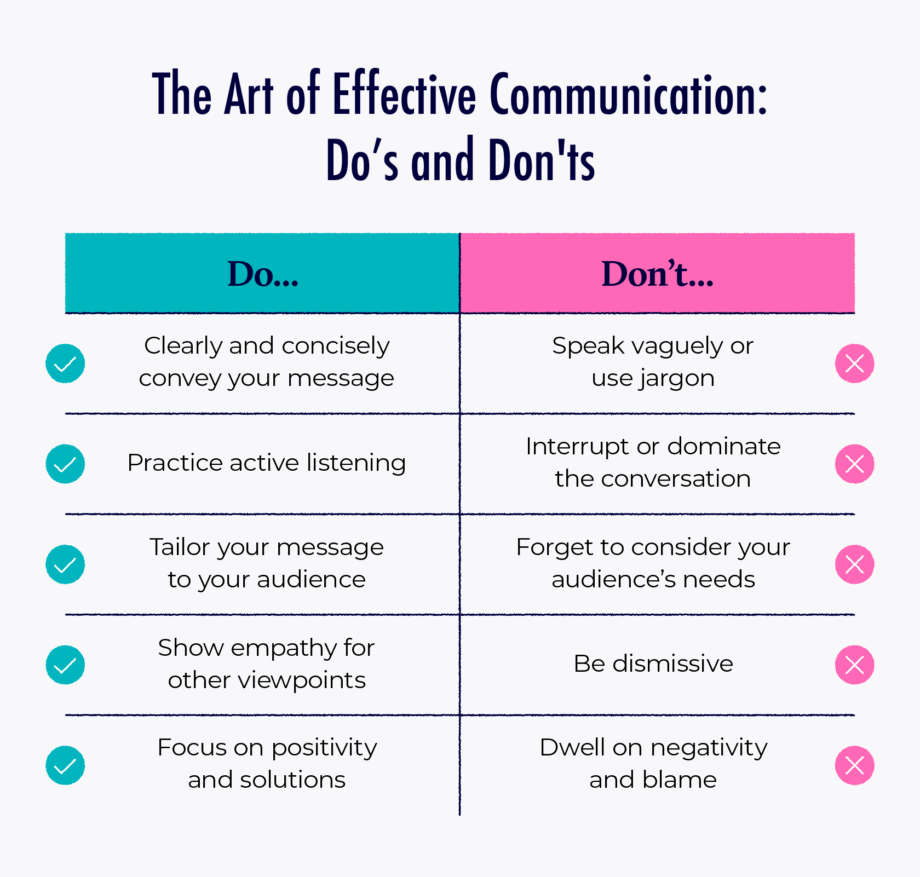I had a conversation with a friend recently about how to communicate effectively in any situation.
I’ll be the first to admit that I truly struggle with this. I’m in my head a lot, and I often say words that are not received in the way I intend.
(I first wrote about this struggle exactly one year ago in a Better Leader Newsletter update.)
It’s frustrating, humbling and drives me to get better. This article is as much for me as it is for you!
As I reflected on that tough question – how do you communicate effectively? – I wrote down four basic principles that I believe build the foundation for great communication.
These principles are powerful and timeless, and they can be applied to nearly any situation where effective communication is required.
Parents, managers, leaders, pastors, teachers and people just like you can benefit from putting these principles into practice as you communicate with others.
Key Takeaways
- The four foundational principles of effective communication are clarity of the message, a “listener’s ear” approach, context awareness and getting in front of anticipated objections.
- Effective communication isn’t simply about what you say; it’s just as much about what the other party hears.
- Choice and economy of words matter, and great communicators know how to use the right words at the right time to get their message across with power and persuasiveness.
1. Clarity is the foundation for effective communication.
Effective communication is clear communication.
Clear communication happens when the message you send is received as the message you intended.
I’d argue that the #1 reason why you don’t effectively communicate is because you aren’t 100% sure of what you are trying to say.
You may have a vague sense of direction, but you must understand that your vague is their confusion. Too often I see people communicating in a way that is more about them getting their own sense of clarity rather than convincing the listener of what they are hearing!
Just like the idea that you can’t solve a problem you don’t understand, you can’t effectively communicate a message you don’t have clarity on.
But how do you get clarity? To be an effective communicator, you must be clear on what you are saying. Here’s a simple process to get clarity on any topic:
- Write what you want to say, then read it out loud to yourself. Verbal processing has a unique way of forcing you to be more clear. I personally practice this with any piece of my writing (this article, email, texts, talks, etc.).
- Point #1 will uncover poorly worded phrases and arguments. Editing is all about saying more with less. Modify what you’ve written so you can speak more forcefully with less effort.
- Repeat the process until you can write and speak about the topic clearly.
As you gain clarity, you’ll suddenly unlock the motivation to communicate clearly. It’s a positive feedback loop that transforms weak communication into effective communication.
2. Effective communication seeks to be understood, not responded to.
When I mention this to people, I typically receive an odd facial expression.
“What do you mean seeks to be understood? Don’t you want your communication to generate a response??”
Yes and no.
As an effective communicator, your foremost job is to communicate in a way that people understand. Your communication will always generate a response, but if you fail to speak in a way that seeks to be understood, the response you receive will not be the response you desire.
Take for example a pastor at a local church. The pastor may have a degree from seminary, comfortable with studying, discussing and writing in theological terms that are native to a university environment.
This is well and good in that context, but it is all too common for preachers to fill their sermons with academic jargon that the average person hasn’t heard of.
In an attempt to confirm their worth or mask their insecurity, they forfeit the foundational principle of communicating in a way that people understand and create confusion as the response of their hearers.
This phenomenon is not limited to the pulpit. I’m in the software business, and I’ve written lots of code during my tenure in the industry. Time and time again, developers will make a presentation needlessly difficult by introducing words and concepts that are too complex.
They’ve both optimized for the “Wow, you are really smart!” response instead of the “Wow, that was incredibly valuable and applicable” one.
Bait the hook to suit the fish.
dale carnegie
Effective communication seeks to be understood. Tailor your message to your audience, and break down complex topics in simple, digestible ways. Avoid words that sound smart and instead use words that make the point clear.
By doing this, you will spark the “Aha!” moment in your listeners – the response at the peak of effective communication.

3. Effective communication considers the environment of the message.
The environment of the message plays a big role in effective communication.
I’ve broken it down into these five areas:
- Right words.
- Right way.
- Right person.
- Right place.
- Right time.
These five areas must be considered and utilized in order for your communication to be effective. Being off on just one of them can completely sidetrack your message.
Most people understand that you need to say the right words. Words are powerful, and wrong words can do real damage.
In fact, Proverbs 18:21 says “Death and life are in the power of the tongue, and those who love it will eat its fruits.” That’s a remarkably strong statement about the impact of our words, for good and for bad.
The other considerations are more subtle. Well-intentioned words can be spoken in the wrong way, causing them to be poorly received. Or perhaps you get everything right – except you tell it to the wrong people!
Or maybe you say all the right things in the right way, but you say them at the wrong time.
Ask yourself these questions when delivering an important message:
- Am I using the right words here?
- Am I saying these words in the right way and in the right medium?
- Am I talking with the right person given the situation?
- Is this conversation happening in the right place?
- Is this the right time?
Devote time to practicing how you would respond to these questions.
The more you practice, the better will you become at communicating the right words, in the right way, to the right person, in the right place and at the right time.
4. Effective communication anticipates questions and objections and responds wisely.
Weak communicators are blind to questions and objections, but effective communicators see questions and objections clearly before they have been surfaced.
Effective communicators are always asking themselves, “What questions will my audience have?” and “What objections will I face?”
It’s surprising how often this simple principle is disregarded. It unlocks so much clarity, and yet people fail to do it because they just don’t believe it’s important.
When you don’t anticipate questions and objections, you openly expose your lack of preparation. This diminishes your influence and makes your communication feel labored rather than effortless.
In times where effective communication is essential such as during collaboration, I have found it helpful to ask those two questions to myself and answer them to the best of my ability. It gives more clarity to how I speak, and it brings a greater sense of mastery over the topic of conversation.
The comforting reality is you don’t have to be an expert on the subject. You just need to understand the questions and objections and be able to respond wisely.
But responding wisely is where you can get into trouble.
Seasoned communicators know the questions and objections that will be raised, but more importantly, they know which ones to entertain and which ones to ignore.
Not all questions or objections need responses. It is your job to learn the difference.
I recently went on a golf trip with a group of men. The makeup of the group was eclectic in terms of skill and familiarity with the game. Some men would have no questions at all, and others would have enough for the entire group.
So as I prepared the ultimate guide (yes, that was in the subject line of the email) for the trip, I asked myself the two questions from above:
- What questions will these men ask?
- What objections will they propose while on the trip?
Certain questions needed answers, such as “Who will I be staying with?” and “What should I bring with me?”. I gave as much detail as possible in my responses.
I also anticipated some objections that would be surfaced in the form of statements. “I’ve only played once in the last year” is a subtle way of forming objections around a couple of things:
- Don’t expect much of me when it comes to playing games on the course.
- I don’t know if multiple rounds of golf in a day is for me.
By anticipating those objections, I addressed them directly in the email, which helped set appropriate expectations for the trip.
But some questions and objections I steered clear of addressing. For example, better golfers typically want to have side games going – which is great! – but commenting on that issue to the entire group would set uncomfortable expectations for less experienced players.
It was a question best answered while down on the course with that small group of golfers, not before the trip began.
I’ve discovered that a helpful barometer to whether or not you’ve responded appropriately is to step back and analyze what you are saying.
If you find it wordy and complex, you’ve likely attempted to answer too many questions or objections and lost the core tenets of what you are trying to say. Clear, concise and compelling should always be the target.
And when you can communicate in that way while anticipating those questions and objections, you’ll be effective every time.
I hope you’ve found this content on how to communicate effectively helpful. If you have, please share it with others by clicking on the share buttons in this article.
You may also find my Welcome to Leadership series helpful. I explore what it means to be a leader, the character traits of great leaders and how to lead yourself.
If you have any questions, feel free to contact me. I’d love to connect!
To more effective communication,
Thomas







This is very short and concise information that immediately teaches me what skills I need to practice independently to become a more effective communicator. This is very helpful. Thank you.
Glad you the guide on effective communication helpful!
This resource on effectively communicating is great – thank you for sharing!
Glad you found it helpful, John!